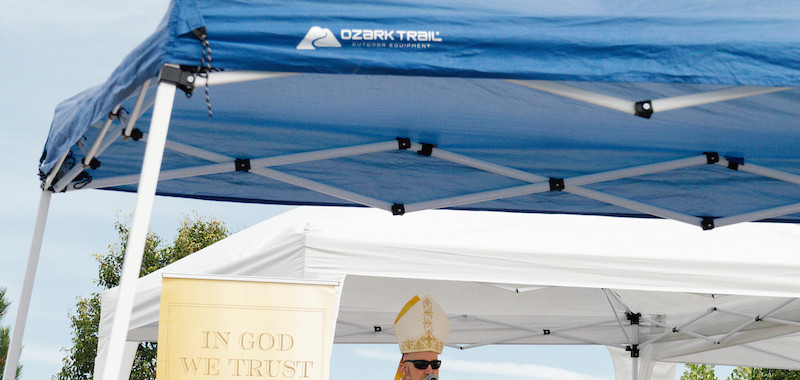PHOTOS | Faith Stronger Than Fear: Denver Veterans Mass Offers Hope Amid National Turmoil
- Sheryl Tirol

- Sep 20, 2025
- 5 min read

Under the warm September skies at the Colorado Freedom Memorial, hundreds gathered earlier this month for an outdoor veterans Mass that took on deeper meaning following a week marked by violence and uncertainty across the nation.
The Archdiocese of Denver's In God We Trust Veterans Mass, held annually to honor both veterans and fallen service members, became a moment of reflection on faith, sacrifice and the challenges facing both veterans and the broader community in increasingly divisive times.
"Our faith is stronger than our fears," Deacon Chris Tranchetti said, referencing the event's theme that has taken on new resonance following the recent attack at Evergreen High School and the assassination of political commentator Charlie Kirk. "We need to continue to embrace that message."
A Sobering Call to Moral Clarity
Archbishop Samuel J. Aquila delivered a homily that addressed the spiritual warfare evident in recent events, drawing parallels to St. Paul's conversion from persecutor to apostle.
"There is good and there is evil," Archbishop Aquila told the gathered veterans and their families. "We can see that the dignity of human beings is not respected by those who choose evil."
Archbishop Aquila's message centered on the necessity of maintaining a moral compass grounded in faith rather than individual preference or popular ideology. Drawing from the day's Gospel reading about good and bad trees producing corresponding fruit, he emphasized the urgency of this foundation in current times.
"If it is not found in God, then everyone becomes God, and you do whatever you want to do, whenever you want to do it, and however you want to do it," he said. "We have seen that lack of moral compass, especially in the events of this week."
The Archbishop's homily included the remarkable story of Rudolph Hess, the Auschwitz officer in World War II, who, before his execution, demonstrated the possibility of radical transformation through divine mercy, seeking to confess to a priest before his death. This message of hope amid darkness resonated with veterans who have witnessed both the worst and best of human nature.
(Photos by Maura Blanchfield/Denver Catholic)
Veterans and the Challenge of Isolation
Rick Crandall, founder and CEO of the Colorado Freedom Memorial, has witnessed significant changes in veteran engagement over his six years organizing the event. While he sees the fruits of the annual event, he also notices a growing isolation among younger service members, particularly after the COVID-19 pandemic.
"I have a granddaughter who comes and helps here a lot, and her high school life was spent at home," Crandall said, emphasizing the importance of in-person interaction. “And, boy, I think we missed that."
Despite resource fairs and outreach efforts, drawing younger veterans to faith-based community events continues to prove challenging.
"When you try to bring them, it's a little scary," Crandall observed. "Their world, during COVID, during deployments overseas, during all of that has been right here. And when you try to bring them out, they say, 'You want me to what?'"
The memorial's veterans ministry, established at Our Lady of Loreto Parish in Foxfield, remains the only active veteran’s ministry in the Archdiocese of Denver, according to Crandall.
Organizers acknowledge they're successfully reaching veterans who already practice their faith but struggle to connect with those who have left religious communities.
"We constantly are trying to get the word out," Deacon Tranchetti said. "We're really hitting the core audience of veterans that are already practicing their faith, but we still want to reach out to those veterans who maybe have fallen away from the faith."
Faith Amid Service
For Skip Munger, a 22-year veteran of three military branches who served in Vietnam, these challenges feel personal. His own faith journey began in the crucible of war.
Converted to Catholicism during his Vietnam service, Munger received his first Holy Communion from Father Vincent Capodanno, a military chaplain who later received the Medal of Honor and whose cause for canonization is now open. He is now recognized as a Servant of God.
"If you really want to know what Father was like, take a look at the movie, Called and Chosen," Munger said, describing the priest who would appear in the middle of firefights to minister to troops. "Not like being there, but it's kind of almost like being there."
Now secretary for the First Marine Division Association’s Rocky Mountain chapter, Munger struggles with the same outreach challenges facing the church ministry. He said many young veterans often view their service as something to leave behind rather than integrate into their future lives.
"It's difficult because they do. It's kind of like they walked away from it. That's behind me, that's my past, and they don't want to be part of their future, but it's always part of your life, it's always there. You can either accept that or let it rule your life,” Munger said. “And we have, unfortunately, some good number of those folks who have committed suicide, whose life has been really taken over by all the things that had happened in their experience."
He added that the challenge of reaching out parallels the Church’s broader post-COVID outreach.
"How do we get them? I think we just have to try, just like we've been trying to do since COVID, get people back to church. This is also a big hurdle as that — trying to reach out to these folks," he explained.
Changing Perceptions of Service
The complexity facing today's veterans extends beyond individual trauma to encompass broader societal shifts.
"Unfortunately, the military is looked down upon by civilians," said Deacon Dave Thompson of the Diocese of Colorado Springs, a Navy veteran now serving at Holy Apostles Parish in Colorado Springs. "In earlier days, especially when we were involved with conflicts overseas, especially in World War II and Korea, men and women were proud to wear their uniforms in public. We don't see that now."
Nonetheless, he says being at the event was deeply important to him.
"I didn't make the sacrifices that a lot of other guys and women did,” he explained. “And so it always brings sadness to my heart, but at the same time, pride, you know, for what they've done and what they've given up. And so I just have this strong urge to honor that."
Symbols of Sacrifice and Hope
Despite the challenges, Saturday's Mass demonstrated the enduring power of faith and community. The Air Force Academy choir provided music, while the Honor Bell Foundation contributed solemn ceremony with its 1,000-pound bronze bell cast with artifacts from veterans of multiple conflicts.
The bell tolled seven times at the conclusion of the service — representing the cycle of a veteran's life: the oath of service, camaraderie, patriotism, respect, dignity, honor, and ultimately, the value of life itself. Since Memorial Day 2016, the bell has tolled at over 7,700 veteran services at Fort Logan National Cemetery in Denver.
"It's unfortunate that most of them were lost and listed as MIA for nearly three decades before they found pieces of bone or artifacts from those service members," said Larry Peterson, a Honor Bell Foundation board member. "That is why I do what I do for those who have served and sacrificed."
Looking Ahead
As the Honor Bell's final toll echoed across the memorial grounds, participants carried with them a renewed sense of purpose. In an era of division and isolation, the gathered veterans found affirmation that their service and their faith continue to matter.
“It's our mission here to honor these fallen on the Freedom Memorial and the work we do with that and even the veterans who served but didn't die, but still wore the uniform,” Crandall reflected. "So don't quit now. We need to be louder than ever been."
































